Have you ever named your car? Do you know someone who has?
It’s a surprisingly common phenomenon and has been around since the very first automobiles. There’s even a National Name Your Car Day (Oct. 2, if you really must know). “Betsy” and “Betty” are the most popular car names.
A 2019 survey in honor of National Name Your Car Day found that 40% of people named their vehicles. That same survey revealed that women are more likely to name their cars than men (56% to 44%). The most popular inspiration for car names is from a TV or movie character, or from a friend or family member.
A History of Naming Vehicles
There’s evidence that ships were being named in ancient Babylonia as early as the 3rd millennium BC. The famed English warship the Mary Rose was launched in 1511. Today watercraft are routinely named, be it a warship during an elaborate launch ceremony or a private individual naming their dinghy after their wife or daughter.
Aircraft have also been named, especially warplanes. As with ships, planes tend to get female names. Famous examples include the Enola Gay B-29 that dropped the atomic bomb on the Japanese city of Hiroshima in 1945, which was named after the pilot’s mother.
There are accounts of cars being informally named by their owners as early as 1918, when MIT professor Walter James wrote about his Model T Ford called “Lizzie,” and a 1912 Cadillac he addressed as “Caddie Maria.”
Anthropomorphism
Anthropomorphism is the attribution of human traits, emotions, or intentions to non-human entities, such as cars. That’s what you’re doing when you say something like “my old Taurus never liked cold mornings,” or “my mom’s Sentra got really temperamental in old age.”
With grilles and headlights that can together form “faces,” cars are particularly prone to being anthropomorphized. Look at the front of an Austin Healey Sprite, Mazda MX-5, Volvo P1800, or Ford Anglia. It’s hard not to see a human-like facial expression (a pretty pained expression, in the case of the Anglia!)
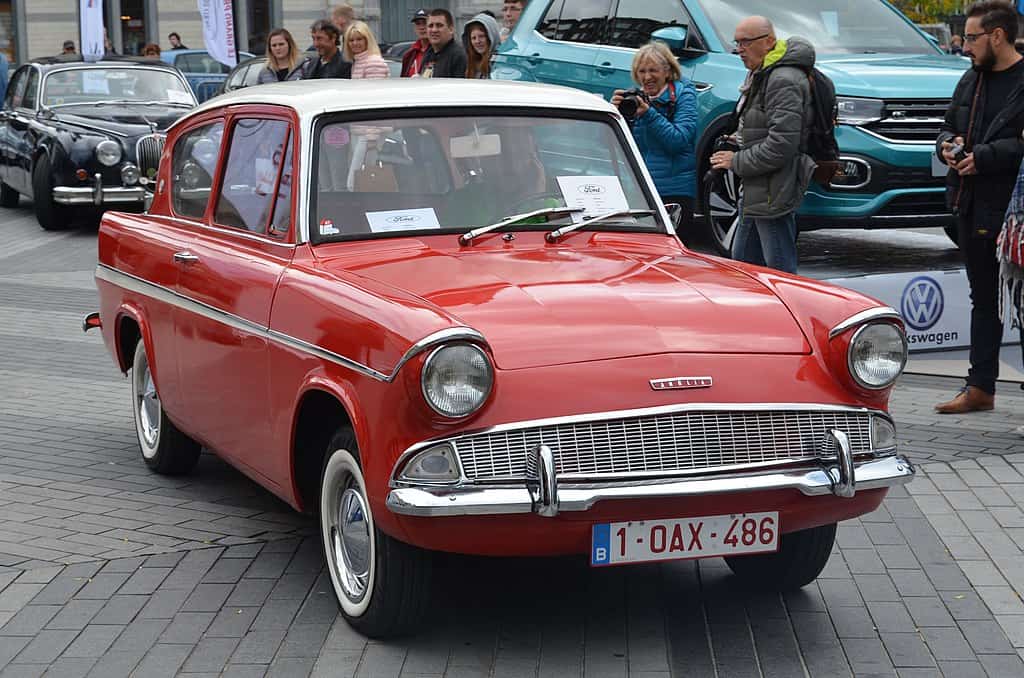
Anthropomorphizing vehicles is commonplace in mass media. There’s the CGI-animated film series Cars; the anthropomorphic 1963 VW Beetle in the Herbie films; and KITT the talking car in the 1980s Knight Rider TV drama.
Addressing a car by a human name is another example of anthropomorphism.
“I absolutely call Chauncey by his name – even when I’m alone,” said Andy Hermann, a writer from Los Angeles, of his 2015 red Toyota Prius C. “And especially when he’s laboring up steep hills (as Priuses tend to do) and in need of a little encouragement.”
Sentience
Sentience is the capacity to feel, perceive, or experience subjectively. When Hermann offers verbal encouragement to his Prius, he’s bestowing sentience upon it. That is, implying that its ability to climb a hill is impacted by conscious will, and not just the interaction of energy and mechanical components versus weight, gravity, and friction.
There’s widespread evidence that humans bestow names and personalities upon their vehicles in order to strengthen desired bonds with them. This can be particularly pertinent when we rely upon these vehicles in perilous situations. Hence warships, warplanes, and even tanks being named.
We may also seek such a bond, if not so fiercely, with an automobile. We may have relied on our car during dangerous weather conditions, huddled in it at the roadside while broken down, or even survived a terrifying wreck with it.
“I believe inanimate objects have a life of sorts, and if you treat them with respect, they’ll treat you the same,” said Cooper Gillespie, a creative entrepreneur/educator in California’s High Desert. “The first car I ever named was a green 1997 Subaru Outback Impreza. I named him ‘Fernando’ after my father’s favorite ABBA song.”
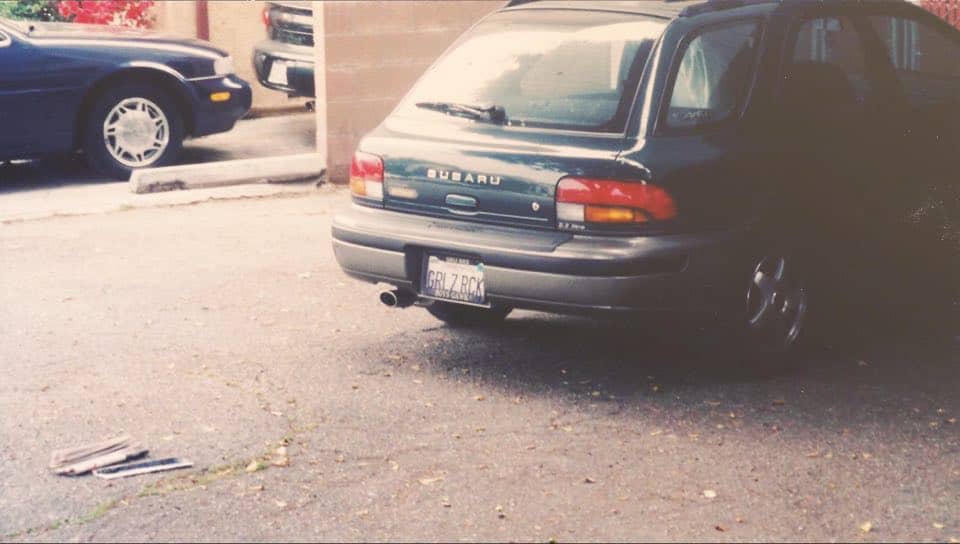
We also go through personal joys and dramas in cars, such as first dates, breakups, and family vacations. It’s common to hear someone say of their car “we’ve been through so much together,” especially when they’re about to sell or scrap the vehicle in question.
“Fernando was just the best. We traveled the country together. He met all my boyfriends,” Gillespie continued. “He kept me safe when I moved to Los Angeles … In LA our relationship deepened because I spent so much time in Fernando. LA was a scary place for this small-town girl, and he was my friend who helped me navigate the big city when I had no other friends.”
But this doesn’t mean that everyone who names their car has some deep connection to it. Last year’s National Name Your Car Day survey found that the majority (57%) of drivers say that naming their car is simply a fun thing to do.
“There’s no deeper significance,” said a 52-year-old former freelance illustrator from the Forest of Dean, England, who asked to be identified only as “Imelda.” She said she’d been naming her cars since her teens. Her latest is a 2012 VW Polo 1400 automatic called “Mildred.”
“Because she is grey, sedate, and very ‘safe,’” Imelda explained. “I don’t refer to my cars by name to anyone but my son; it’s our private joke … I don’t seriously believe she’s sentient.”
Assimilating Technology
Forming the perception of a personal bond with a machine may be connected to our efforts to assimilate increasingly complex technologies that many of us don’t fully comprehend. For someone who’s not mechanically minded, it may be easier to try to understand a car’s apparent idiosyncrasies in human terms, with which we’re more familiar.
For many drivers, it may be more comfortable to say, “My car hates winter mornings” than to relate its reluctance to cold-start to low fuel pressure or fouled spark plugs, of which they perhaps have little understanding. Shouting “don’t let me down now, Betty!” while traversing a flooded roadway may be more reassuring, and simply more viable to many of us than running a mental checklist of components and functions potentially compromised by immersion in water.
“I can still hear our drummer patting its dash saying, ‘c’mon Landship, you got this ole boy!’ when it would dog a little in the mountains,” recalled Matt Southwell, a guitarist and marine technician/pilot in Alpena, MI of his old Dodge Ram 1500 tour van.

In situations like these, we’re projecting qualities such as loyalty, enthusiasm, and even grumpiness onto our cars. And we’re seeking a companion to help us through a period of stress. But we’re also acknowledging a very human-like quality of cars, and particularly of older cars – unpredictability. This could be why it tends to be older cars than “earn” a name or perceived personality.
Considering that there are around 30,000 parts in a typical car, all of which wear and interact in different ways over time, attributing a unique persona to an old car isn’t entirely illogical. Even a vehicle that’s only a few years old may be truly unique in the combined interaction of all its variously worn parts. And it will perform – or “behave,” if you’re less mechanically-minded – accordingly. There are even experienced mechanics who will bestow people-like personalities on cars.
“But no one really expects their car to answer back,” Imelda insisted.
Attributing Gender
In last year’s National Names Your Car Day survey, 74% of respondents said their car had a gender, with 53% identifying it as female. This contrasts with ships and planes, which are almost universally given female names and personalities.
But some of the drivers interviewed for this article insisted that their cars can be male or female. So while Imelda named her current car “Mildred,” her previous car – also a VW, but what she called a “nippy” manual – was christened “Marco.”
“My wife and I have agreed that when it comes to names, her cars are girls and mine are boys,” offered Hermann. “Her car is a Chevy Bolt named Philomena.”
Drivers polled for this article reported predominantly female names for their cars, including “Daphne,” “Sadie,” “Harriet,” “Brenda,” and “Maggie Mae.”
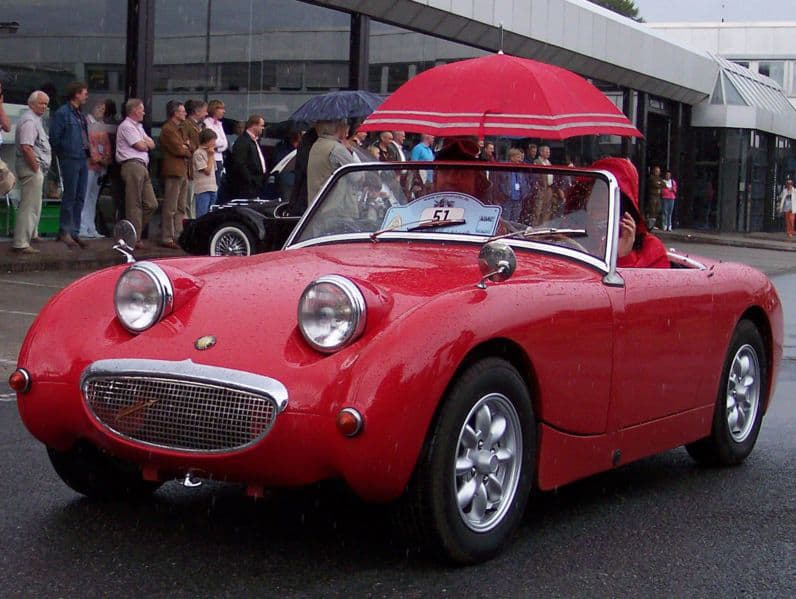
Appearance, Performance, and Reliability
Many of the drivers polled for this article chose names, often non-human names, related to their car’s appearance or performance. So a brown van was dubbed “Chocolate Thunder;” a chili-red MINI Cooper S became “Sriracha;” a huge 1979 Chevy Malibu was “Moby”; a black MG Midget was “the Black Pig;” a purple VW bug became “Purple Snot,” and a yellow Mini “Banana Slug.”
“We called it Landship originally because its interior was this padded fabric with wood, spring-loaded doors everywhere,” said Southwell of his old van. “It just totally felt like climbing aboard a sailboat!”
One respondent had a car with pop-up headlights. After a fashion, only one popped up. So she called the car “Winky.” Another named his Acura MDX “Enterprise” due to its hi-tech lanes-assist technology.
Two respondents, both middle-aged male heavy metal fans, reported calling their powerful rides “The Beast.” One of these, Paul Bliss from Gloucester, England, enhanced the effect on his blacked-out BMW X5 with “666” and his initials on the license plate. Michael Wildenauer, from North Rhine-Westphalia in Germany, dubbed his Mercedes-Benz AMG E55 wagon “Monster” in reference to its “monstrous 560 HP.”
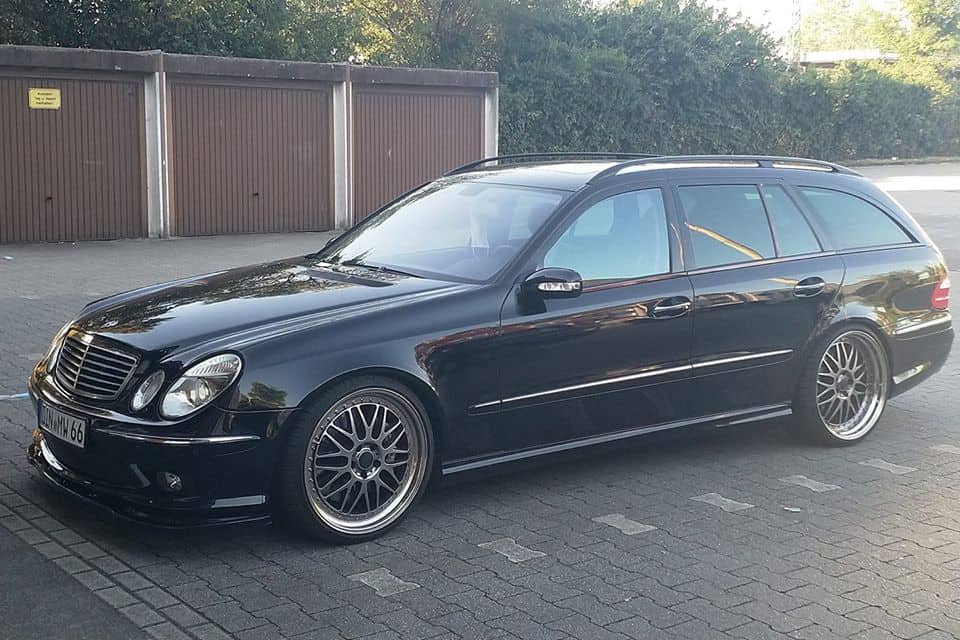
Another respondent christened his dad’s Honda coupe “the Time Delay Module” because “you always got places quicker than expected in it.”
Drivers who not only name their cars but also lend them a human-like personality often do so because of perceived reliability (or lack thereof). Hence Southwell’s “Landship” tour van later became “the Unsinkable Landship”.
“We were the only band I know of who never missed a gig because ‘the van broke down’!” he recalled. “I firmly believe Landship had a soul. It limped all the way from LA to Austin running rough with the coil wire popping off. But ‘Unsinkable’ got us there!”
Sybil Goodkin, an NGO program director from Gig Harbor, Washington, remembered buying a black 1992 Ford Bronco from that already had the nickname “Bruce” from its previous owner.
“But the name fit,” she said. “He was big and sturdy and I felt safe in him always.”
Other Naming Inspirations
Nostalgia can be another inspiration for the naming of cars.
“I always thought of my dad when I drove that car,” said Gillespie of the Subaru she named after one of her father’s favorite songs.
Laura Cataldo, a creative and full-time mom from Lodi, CA, christened her pearl-white 2017 Toyota Highlander SUV “Mini Pearl.”
“It was [my partner’s] joke at first, but also very nostalgic of our last vehicle,” she explained. “We went from my little Mini Cooper to a Highlander when we moved from the crazy city life to the relaxed country with a little baby in tow. I miss my teeny car – she would literally fit right inside this one.”

Some cars earn a name over time due to their appearance, abilities, or just the activities and memories associated with them. Goodkin said she named her first car, a 1972 VW Squareback, “Jah Love Mobile” because “the first bumper sticker it got was a ‘Jah Love’ reggae sticker” and “well … the back seats folded down. Wink, wink!”
One male respondent reported having had a Ford Escort van during his carefree single days dubbed “The F*ck Truck” by his friends.
As befits a writer, Hermann actually researched a name for his Prius.
“Chauncey came from a dealership in Torrance. So to find a good name for him, I went to the Wikipedia page of ‘notable people’ from Torrance and decided which of their names best fit the car,” he said. “It happened to be Chauncey Washington, a former NFL running back I had never heard of before.”
Another respondent said he usually creates names for his cars based on their license plates. And then there are plays on brand names: “Sadie” for a Mercedes-Benz bus; “Suzy” for a Suzuki or Isuzu; or “Mitzy” for a Mitsubishi.
The Future of Naming Cars
While many drivers report naming all their cars, it was overwhelmingly older cars than earned a name related to a perceived “personality” or history. For example, Tim Boland, a musician and music producer from Los Angeles, called his 1961 Chrysler “Frenchie” because of a previous owner’s name he’d seen on its paperwork. Or Southwell’s “Unsinkable” van becoming so-called after many trouble-free tours.
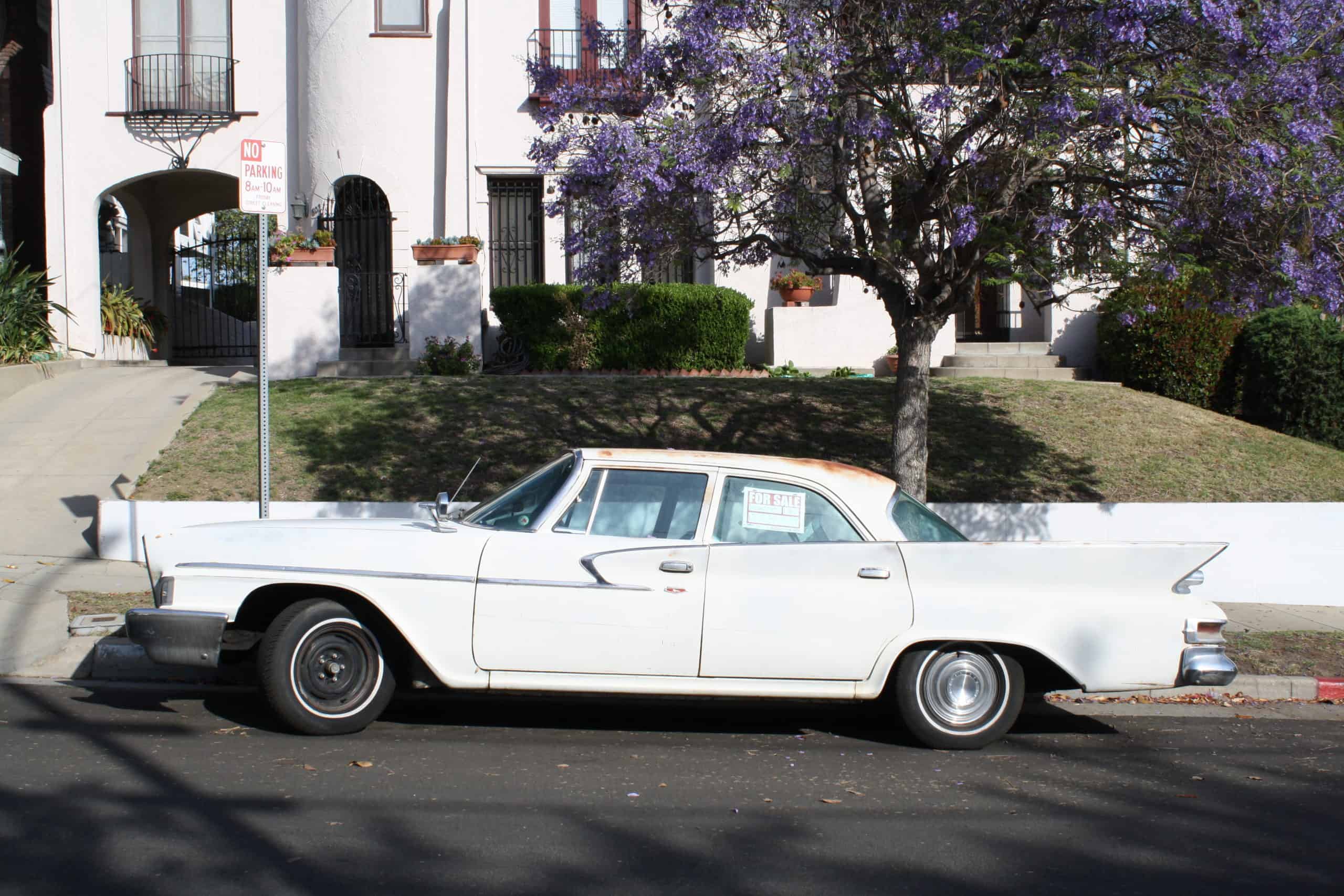
Some drivers said that while they named their earlier cars, which were often beaters with numerous eccentricities, they stopped doing so once they could afford brand new, often more “sensible” models. These performed predictably, as designed.
Newer cars tend to exhibit less “personality” than older models, especially in an era of computer-controlled, globalized mass production and quality control. The so-called “Friday afternoon car” – one with numerous faults due to assembly line workers being less attentive at certain times – is largely a thing of the past.
Yet maybe there’s more of a case for naming cars than ever before, precisely because they’ve become so homogenized and anonymous. Like adding a vanity license plate or bumper stickers, naming a car is a way of distinguishing your Corolla, Civic, or F-Series from all the others in your neighborhood, even if only in your own perception. And it’s also an effort to express and define our individual personas in an increasingly impersonal world.
“I suppose I do feel a bit embarrassed by the car-naming thing,” admitted Imelda. “But as vices go, I think it’s pretty harmless.”
So will you continue to name your cars, even those that are brand new and “boring”?

